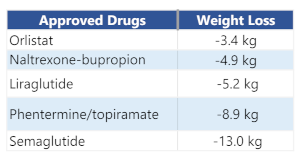Is This The Magic Weight Loss Pill?
August 08 2022
There has been number of weight loss drugs in the market. But this one has surprised a lot of obesity experts - in a good way.

Around 40% of the US adults are obese and these numbers are steadily getting worse. The study in question was recently published in NEJM - one of the premier medical journals. So let’s take a closer look:
So what was the study design?
- Population: 1960 participants greater than BMI of 30 (obese) or 27 or greater with one or more treated or untreated risk factors from 129 sites in 16 countries. So an international multi-center trial.
- Intervention: The intervention group took once a week injection Semaglutide (at a dose of 2.4 mg) plus lifestyle changes (diet and exercise)
- Control: The control group took a placebo injection plus life style intervention.
- Outcomes: The primary outcome was the % of weight lost.
What were the results?
The mean BMI was around 37 (Class 2 obesity). After 68 weeks, the drug group lost 15% while the placebo lost 2% of their body weight. That is, the drug group lost 15.3 kg while the placebo group lost a meagre 2.6kg. So almost a 13 kg weight loss! For the metrically impaired, that is a whopping 30 lbs!
My comments:
Weight loss: Currently available FDA approved obesity drugs have struggled to show double-digit (>10%) weight loss and shows 5-8% weight loss. At present, the most efficacious drug (Phentermine/topiramate) reduces bodyweight by 8% compared to placebo. In contrast, the avg weight loss in this study was a remarkable 15%. Further, 1/3rd of the participants showed a 20% weight reduction which is close to results for bariatric surgery (around 25% using sleeve gastrectomy)! Rightfully so, these results have pleasantly surprised a lot of the obesity experts.
1-yr Weight change compared to placebo for FDA approved drugs

Mechanism: So how does it work? It works by mimicking a hormone that is produced in the body after you eat. The hormone suppresses appetite/food intake by acting on appetite centers in your brain. So the drug is essentially rewiring your brain. Partcipants in the study reported less appetite and food cravings, better control of eating and lower relative preference for fatty, energy-dense foods. Mind you, most obesity drugs work their “magic” by suppressing appetite and thus making you eat less!
Harms: Nausea and diarrhea were the major complaints. Other events were constipation, nausea, abdominal pain, headache, or fatigue. For the forgetful, let’s not forget the checkered history of weight loss drugs: To name a few recent ones, Sibutramine was withdrawn in 2010 due to increase in heart attacks, strokes, and deaths; Lorcaserin in 2020 due to increase in cancers. In other words, harms of the drugs are as important as weight loss benfits. Long-term side effects of the drug are still unknown, especially important when dealing with chornic conditions like obesity.
Cost: I like everything about the drug, except the horrible price: Slightly more than thousand dollars for a month’s supply. And guess what, insurance do not cover weight loss drugs either. They still argue that obesity is a behavioral choice and not a disease. Several smart folks have argued obesity to be best considered as a chronic condition requiring lifelong medications just like every other health conditions, like heart disease and diabetes.
Other studies: This study was the first of the STEP 1 Trials. They have concluded around 8 studies (STEP 1-8) looking at different populations and dosages and cardiovascular outcomes. For example, in people with diabetes and in east Asians. All seem to show similar and positive effects.
Genetics of obesity: The science is very clear now that there is a strong biological basis for obesity. This drug is yet another example of how finally the brain dictates how much you eat. I remember writing an article titled “Cause of obesity” 12 years back arguing for the powerful role of genetics in obesity. And as expected, it received a lot of push back then. Only around 1% of the obese take a weight loss pill. This is largely because of the prevailing ‘wisdom’ that obesity is a choice; a narrative that further drives the stigma that comes with obesity.
Conclusions
- The drug shows almost 15% weight loss - almost double the weight loss than any of the currently approved drugs.
- Side effects were mainly gastrointestinal, but long-term effects are unknown.
- $1250,00 for a month’s supply - an irresistible drug at an unaffordable price.
- Ending with a quote that sums up obesity succinctly, “Genes make the gun, while environment pulls the trigger.” Once-Weekly Semaglutide in Adults with Overweight or Obesity



